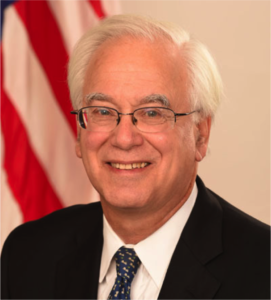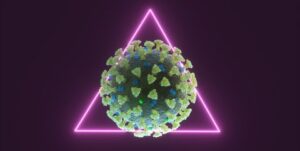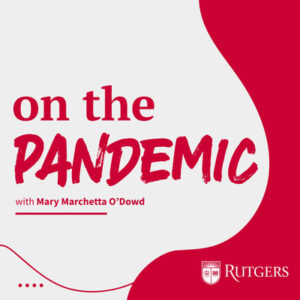RUTGERS
Dr. Emily Barrett Discusses the COVID Health Care Worker Study
Health Care Worker COVID-19 Study
The Rutgers Corona Cohort Study
For the Rutgers Corona Cohort Study (RCC), 98% of the original group of participants completed the visit 8 weeks after the study began – a staggeringly impressive statistic and a testament to everyone’s commitment to this community effort.
Very fortunately, the rates of detectable SARS-CoV-2 infection in our participants have gone down considerably, from 5% in tests done at study entry and 2 weeks later, to 2% at the 4-week visit, to under 1% at the 8 week visit. These changes parallel the declines in the numbers of patients with COVID-19 who have been admitted to the participating hospitals (Figure 1) as well as the declines seen in New Jersey more broadly. Over this same time, we have seen antibodies to SARS-COV-2 rise from 1% at baseline, to 5% after 2 weeks, to about 8% after 4 and 8 weeks. Of note, the rates of both detectable virus and antibodies have differed quite a bit between the participating hospitals and between healthcare workers and others (Figure 2).
The research team is still working to understand whether everyone who had an infection produced antibodies, how people’s symptoms corresponded to the levels of antibodies, what types of antibodies people made, and how the levels of those antibodies have changed over time. We look forward to sharing what we learn on this website.
(Article and graphs by Daniel B. Horton, MD, MSCE, RWJ Medical School. Originally published in the Rutgers Corona Cohort Study Newsletter 7/17/20 and updated for the NJ ACTS website 9/1/20.)
Rutgers Launches Clinical Trial to Test COVID-19 Treatment for Kids
Rutgers will participate in a global Pfizer-BioNTech research study to evaluate the safety and efficacy of a potential oral antiviral treatment for children under 18 years with COVID-19 who have health conditions that put them at risk for severe illness.
Rutgers Scientists Develop Test That Easily Detects Variants Causing COVID-19
The test, which uses “molecular beacon” technology, will be made freely available to other labs
Rutgers scientists have developed a lab test that can quickly and easily identify which variant of the virus causing COVID-19 has infected a person, an advance expected to greatly assist health officials tracking the disease and physicians treating infected patients.
How Rutgers became a national model for COVID-19 response
It took less than three weeks from the time the first case of coronavirus emerged in the United States for Rutgers University leaders to prepare its response to what would be one of the worst crises in world history. And it took just another two weeks for it to put together 14 emergency response teams of more than 200 individuals to ensure its campuses and health facilities would be protected. Every institution in the U.S. has its own incredible story to share, but the sheer size and scope of the Rutgers response to COVID-19 over the past two years has been one of the great success stories of higher education.

Martin J. Blaser

Jeffery L. Carson

Reynold A. Panettieri
As Omicron Surged, Rutgers Nursing Undergraduates Headed to Frontlines
COVID-19 was wreaking havoc again in late December and state health officials were worried. The Omicron variant was causing some of the highest case levels since the start of the pandemic, hospital beds were filling up and nurses and other health care workers were getting sick or quarantining because of exposure. New Jersey Health Commissioner Judith Persichilli, worried about another COVID surge, asked Rutgers and other New Jersey colleges and universities with health sciences programs if they could help tackle the crisis. “I had an idea, but didn’t know if it would work,” said Susan Salmond, executive vice dean at Rutgers School of Nursing: The Student Nurse Reserve Corps. To read the full story.
How the COVID-19 Pandemic is Affecting Black and Latinx Health Care Workers in Support Roles
A Rutgers study gives new insight into the experiences and perspectives of Black and Latinx people working in supportive health care roles during the COVID-19 pandemic. The study is the first to focus on the experience of support health care workers from underserved communities during the pandemic. While nurses and physicians are the most recognized frontline workers, there are a variety of other roles in healthcare that are overshadowed and lower paid, such as certified nurse assistants, therapists, emergency medical service personnel and food services and custodial staff. This essential workforce comprises nearly 7 million people, most of whom are Black and Latinx women and live in the communities they serve. The findings, which appear in the journal PLOS ONE, can be used to develop public health messages and strategies. To read the full story.
PRINCETON
Using Artificial Intelligence and Innovative Design to Save Patient’s Lives During the COVID19 Pandemic
SARS-CoV-2 infection may lead to Coronavirus Disease 19 (COVID19), which can severely hamper the function of a patient’s lungs and require that the patient utilize a medical device to help them respirate. One such device to help patients effectively respirate is a ventilator: a mechanical device invented more than 150 years ago that mechanically controls air pressure and flow to a patient. In addition to patients suffering from COVID19, ventilators are used in a wide array of medical interventions, including general anesthesia.
While modern day ventilators save patient’s lives, they are expensive and require extensive training for proper use. Not only do settings, such as target air pressure or air volume provided, need to be properly calibrated to each patient, but these settings may change for an individual patient over time. If ventilators are not accurately attuned to the specific patient, a ventilator may actually cause harm to the patient’s lungs.
Two groups of Princeton researchers, led by Daniel Cohen and Elad Hazan, set out to improve these two issues with ventilator use. Daniel Cohen’s group at Princeton, spearheaded by Julienne LaChance, along with Dr. Daniel Notterman, Manuel Schottdorf and Grant Wallace from the Princeton Neuroscience Institute, Zhenyu Song, Tom Zajdel and Sophie Dvali, first designed a more cost-effective and rapidly deployable ventilator that can be assembled using build instructions from replaceable “off-the-shelf” parts.
Our COVID-19 vaccines would not exist without this unsung Princeton technology
It might not look like much — a plastic box that fits in the hand, with tiny tubes jutting out the top and bottom. Too simple to be cutting edge. Too humble to save so many lives.
But for 20 years, researchers in Robert Prud’homme’s lab have fine-tuned this little box that has revolutionized drug manufacturing, enabling everything from mRNA-based COVID-19 vaccines to malaria drugs. The life-saving molecules that treat those diseases are fragile, and they must survive an epic voyage from a lab bench, through the supply chain, into a blood cell. Encapsulation gives them a secure vehicle and a final heading. It’s a delicate craft backed by complex mathematics, and over the arc of his career, Prud’homme has become a master craftsman.
NJIT
NJIT Machine Learning Expert Pan Xu Combats COVID Vaccine Inequity
 An NJIT computer scientist studied COVID vaccine data from Minnesota to design equitable methods of distributing vital resources during any widespread emergency. The resulting algorithm showed that giving everyone equal access to vital resources isn’t necessarily the best approach, depending on the methods and desires of emergency authorities, explained Pan Xu, assistant professor in Ying Wu College of Computing. For example, if an emergency disproportionately impacted people of certain ages, ethnicities, incomes, locations or races, then those communities should get greater percentages of whichever resources were needed to help them, Xu noted. That could mean withholding the resources from other groups who are better empowered to withstand delays. To read the full story.
An NJIT computer scientist studied COVID vaccine data from Minnesota to design equitable methods of distributing vital resources during any widespread emergency. The resulting algorithm showed that giving everyone equal access to vital resources isn’t necessarily the best approach, depending on the methods and desires of emergency authorities, explained Pan Xu, assistant professor in Ying Wu College of Computing. For example, if an emergency disproportionately impacted people of certain ages, ethnicities, incomes, locations or races, then those communities should get greater percentages of whichever resources were needed to help them, Xu noted. That could mean withholding the resources from other groups who are better empowered to withstand delays. To read the full story.
COVID-19 Vaccines Breathe Life into Research Done 20 Years Ago
 Research conducted 20 years ago by a former NJIT dean is being put to new use in the COVID-19 vaccine from Pfizer-BioNTech.
Research conducted 20 years ago by a former NJIT dean is being put to new use in the COVID-19 vaccine from Pfizer-BioNTech.
Barry Cohen, who was an associate dean of Ying Wu College of Computing, worked on the algorithm for bioengineering stable messenger RNA (mRNA), a key ingredient of the vaccine recently approved for emergency use by the U.S. Centers for Disease Control and the Food and Drug Administration. Read the Full Article.

